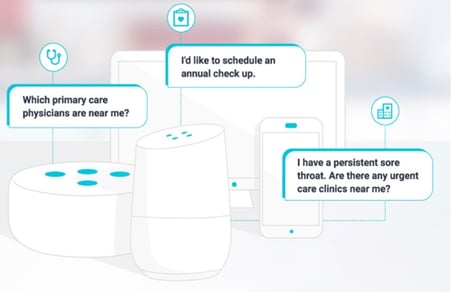
Helping Patients Find Your Healthcare Organization with Voice Search Optimization
In the last 30 years, we've progressed from "Ask Mom or Dad" to "Ask Alexa or Siri" if we have a question.
 The first search engine was introduced in 1990 for people to type in keywords and phrases to navigate to the information they wanted to find. In response to the increasing demand for web search, organizations and brands started introducing and working on a process called search engine optimization (SEO) to increase their website's search engine rankings and maximize the number of visitors from the search results page. This includes optimizing websites for keywords, titles, and calls to action.
The first search engine was introduced in 1990 for people to type in keywords and phrases to navigate to the information they wanted to find. In response to the increasing demand for web search, organizations and brands started introducing and working on a process called search engine optimization (SEO) to increase their website's search engine rankings and maximize the number of visitors from the search results page. This includes optimizing websites for keywords, titles, and calls to action.
In 2016, Amazon introduced their Alexa smart speaker, triggering the voice search revolution and a significant shift in the way websites optimize their pages for search engine crawlers. This shift has altered the digital landscape and moved us beyond the traditional keyboard and even touchscreens. More than ever before, people are relying more heavily on virtual assistants and voice services for streamlined access to resources and information.
Check out some recent stats on the growth of voice search, specifically into the healthcare industry:
- Close to 50% of consumers are using voice for web searches
- Voice search and voice assistants are accessible through 3.5 billion smartphones globally
- 71% of consumers prefer to conduct queries by voice instead of typing
- 51.9% of consumers are interested in using a voice assistant in healthcare
- 72.9% of healthcare voice assistant use cases involve symptom checking
- 45.9% use voice assistants to ask about medical information
- 37.7% use voice assistants to find the location of a health-related service provider
 Now that we are several months into the COVID-19 pandemic, people are increasingly turning to smart speakers for entertainment, news, communication, and healthcare.
Now that we are several months into the COVID-19 pandemic, people are increasingly turning to smart speakers for entertainment, news, communication, and healthcare.
Since March 2020, many people who had never used voice assistants have now reported using conversational AI out of convenience and/or necessity - particularly in healthcare. This has driven healthcare organizations to seek out accessible solutions to implement a voice search optimization strategy to connect with more patients.
Keywords and phrases used in voice searches are conversational and often longer than traditional search keywords. So, while you may have optimized for text-based searches, there are different ways to optimize for voice.
Leveraging healthcare conversational AI is the key to optimizing your website for the new wave of voice search, and here's how Orbita can help.
To empower healthcare organizations to optimize their online presence for natural language questions, Orbita has created a conversational AI platform. This platform powers solutions like the OrbitaENGAGE digital front door solution, which helps patients find your website more easily when they search for care.
Within this solution, technology behind OrbitaANSWERS enables your organization to publish content from your website in a Q&A format so that search engines, such as Google and Bing, can display the results back to patients.
If a patient wants to learn more about cataract surgery, he could ask, "Will cataract surgery improve my night driving?" or "Will cataract surgery improve my driving at night?" or any similar combination.
Orbita publishes these variants in diction to search engines where they are indexed and optimized for voice SEO to deliver the best-fitting answer to the patient.

To further enhance your website with the OrbitaENGAGE digital front door solution, the virtual assistant can provide contextualized information based on the conversation and suggest relevant topics to patients on their search results page.
For example, the patient searching for resources on cataract surgery could be asked if they would like to schedule an appointment with an ophthalmologist. Within this conversation, there is easy access to selecting a location, scheduling an appointment, and asking any additional questions.
With the reliance on digital tools and resources today, it is essential to not only answer a patient's question, but also provide them with information they are likely going to ask for or could benefit their search and care journey in a relevant way.
Orbita's healthcare conversational AI technology is omnichannel, helping your organization reach and support patients across a wide variety of channels that they are most comfortable with - including SMS, phone, email, and smart speaker. By reaching patients across many different channels like these (including patients with varying levels of digital literacy), your organization can improve its SEO initiatives and ultimately increase patient engagement across your website and improve search engine rankings on Google and Bing.

![Download Now: The Ultimate Guide to Voice Search & Why it Matters to Marketers [Free White Paper]](https://no-cache.hubspot.com/cta/default/541637/a058d0c2-10b5-4823-a7a3-e4b11c6f18cb.png)